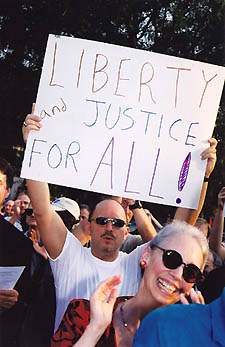A Supreme Victory
The biggest gay rights victory ever will lead to an even larger battle over marriage
One down, two to go.
Wherever one stands on last week’s Supreme Court decision striking down sodomy laws — with Justice Anthony M. Kennedy’s moving and inclusive call for dignity in privacy or with Justice Antonin Scalia’s vituperative call to arms for kulturkampf — it seems most agree about the importance of the ruling.
Lawrence v. Texas may be the big domino that sets off a chain reaction leading to gay marriage and military service.
For some, sodomy law repeal, marriage and military service are the holy grail of gay activism. Andrew Sullivan famously declared that when those goals were achieved, the gay rights movement should declare victory, close up shop and go home. In effect, with the federal government treating gays and lesbians as full citizens in a civil society, the broader private society would have little choice but to follow.
 |
Obviously, not everyone agrees with that as an organizing principle — other goals such as adoption and employment non-discrimination may be more easily reached at first, and could provide stepping stones to such larger goals — but nearly everyone does agree that Lawrence is a turning point for the gay rights movement.
From the gay and lesbian perspective, the joy has been near unanimous. Not only did the justices overturn the archaic and frankly hateful Bowers v. Hardwick, where the Court found no constitutional right to homosexual sodomy, the infamous case was essentially smacked down for many of the same reasons activists have used to argue against it for almost two decades: The assumptions were false, the history narrow and self-serving, and the bigotry all too apparent.
“To say that the issue in Bowers was simply the right to engage in certain sexual conduct demeans the claim the individual puts forward, just as it would demean a married couple were it to be said marriage is simply about the right to have sexual intercourse,” writes Kennedy. While most court observers, gay and straight, expected a narrow ruling overturning the Texas anti-gay sodomy law, few expected such broad and sweeping language from a court considered fairly conservative.
In the media frenzy following the release of the decision, it took mere minutes for one meme to rise to the surface of the gay community: Lawrence, with its broad and respectful recognition of gays and lesbians and their role in society, would be the gay community’s own Brown v. Board of Education, a legal decision so enormous that society would be forced to change in fundamental ways to accommodate it.
Is Lawrence that enormous? Possibly. It is the biggest single victory the gay community has savored, and the implications for federal and state gay rights legislation and policy will reverberate for years to come. Morality-based anti-gay adoption laws, such as Florida’s, can expect new scrutiny. Gay and lesbian parents across the country who have been denied custody of their children because sodomy laws presumed them criminals will soon be back in courts demanding reinstatement of their parental rights.
But what’s also certain is that what comes next in the domino chain will be much, much bigger. It’s no surprise, really, that both pro- and anti-gay forces, in the wake of Lawrence, immediately began talking marriage.
Many gay pundits and activists have predicted that overturning sodomy would provoke little reaction from the American public, a prediction that seems solid given post-Lawrence polls showing solid majority support for the Court’s decision. But the words “gay marriage” elicit a far more negative response, threatening a backlash against gay political progress even larger and more damaging than the early 1990s fight over gays in the military that ended with “Don’t Ask, Don’t Tell” as the law of the land.
Hence the immediate move to marriage issues on the part of the anti-gay right. Although many prominent conservatives opposed sodomy laws for libertarian and other reasons, they are far more united when it comes to fighting gay marriage. The timing is ripe for a battle: In addition to Lawrence, one province in Canada recently made civil marriage available for same-sex couples, and the Massachusetts State Supreme Court is expected to rule on a same-sex marriage lawsuit later this month.
While the Lawrence majority took pains to say the ruling had no implications for gay marriage, Scalia scoffed at the notion, explicitly raising marriage — along with bestiality, incest and prostitution — as the logical by-product of the ruling.
“This reasoning leaves on pretty shaky grounds state laws limiting marriage to opposite-sex couples,” Scalia writes. He swipes at Justice Sandra Day O’Conner’s concurring opinion that denotes “preserving the traditional institution of marriage” as a legitimate state interest.
“‘[P]reserving the traditional institution of marriage’ is just a kinder way of describing the State’s moral disapproval of same-sex couples,” Scalia writes.
Just how big the backlash could be became much clearer last Sunday when Senate Majority Leader Bill Frist (R-Tenn.) declared on ABC’s This Week his support for a constitutional amendment banning same-sex marriage.
“I very much feel that marriage is a sacrament,” Frist said, “and that sacrament should extend and can extend to that legal entity of a union between — what is traditionally in our Western values has been defined — as between a man and a woman. So I would support the amendment.”
The Federal Marriage Amendment (FMA), as the proposal is called, was introduced in the U.S. House of Representatives earlier in June. A coalition of groups has pushed for the amendment for months, but Lawrence appears to have given the movement political traction. Mindful of the gays-in-the-military political debacle, where anti-gay forces made early gains in public opinion that they never lost, gay and lesbian political groups are gearing up for a similar battle. One advantage is that passing a constitutional amendment is a years-long process, and rarely successful, as supporters of the Equal Rights Amendment and the amendment banning flag burning have found.
But Frist’s use of the term “sacrament” also hints at a current strategy in the fight against gay marriage, that it infringes on the free speech of religious organizations. Although religious marriage and civil marriage are two different things — gays and lesbians can have religious marriage ceremonies in those churches that perform them, while the legal benefits of civil marriage are off limits — they are not often thought of as separate things, leading many to fear that imposition of same-sex civil marriage would force churches to accept them.
While that’s not the case, it’s a powerful argument. And many opponents of same-sex marriage are ready to make it because they view gay marriage as inevitable.
“The likelihood of nationalized gay marriage is real, and the Federal Marriage Amendment is the only way to stop it,” writes National Review contributing editor Stanley Kurtz on the magazine’s web site. “That’s why Majority Leader Frist’s announcement of support for FMA is so important. Looks like the battle has already begun. After Massachusetts, it explodes.”
Support Metro Weekly’s Journalism
These are challenging times for news organizations. And yet it’s crucial we stay active and provide vital resources and information to both our local readers and the world. So won’t you please take a moment and consider supporting Metro Weekly with a membership? For as little as $5 a month, you can help ensure Metro Weekly magazine and MetroWeekly.com remain free, viable resources as we provide the best, most diverse, culturally-resonant LGBTQ coverage in both the D.C. region and around the world. Memberships come with exclusive perks and discounts, your own personal digital delivery of each week’s magazine (and an archive), access to our Member's Lounge when it launches this fall, and exclusive members-only items like Metro Weekly Membership Mugs and Tote Bags! Check out all our membership levels here and please join us today!






















